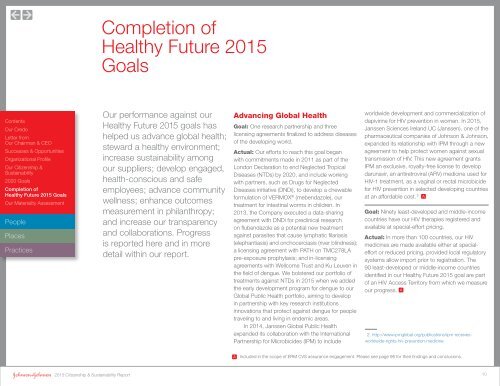People Places Practices
2015-JNJ-Citizenship-Sustainability-Report
2015-JNJ-Citizenship-Sustainability-Report
Create successful ePaper yourself
Turn your PDF publications into a flip-book with our unique Google optimized e-Paper software.
Completion of<br />
Healthy Future 2015<br />
Goals<br />
Our performance against our<br />
Healthy Future 2015 goals has<br />
helped us advance global health;<br />
steward a healthy environment;<br />
increase sustainability among<br />
our suppliers; develop engaged,<br />
health-conscious and safe<br />
employees; advance community<br />
wellness; enhance outcomes<br />
measurement in philanthropy;<br />
and increase our transparency<br />
and collaborations. Progress<br />
is reported here and in more<br />
detail within our report.<br />
Advancing Global Health<br />
Goal: One research partnership and three<br />
licensing agreements finalized to address diseases<br />
of the developing world.<br />
Actual: Our efforts to reach this goal began<br />
with commitments made in 2011 as part of the<br />
London Declaration to end Neglected Tropical<br />
Diseases (NTDs) by 2020, and include working<br />
with partners, such as Drugs for Neglected<br />
Diseases initiative (DNDi), to develop a chewable<br />
formulation of VERMOX ® (mebendazole), our<br />
treatment for intestinal worms in children. In<br />
2013, the Company executed a data-sharing<br />
agreement with DNDi for preclinical research<br />
on flubendazole as a potential new treatment<br />
against parasites that cause lymphatic filariasis<br />
(elephantiasis) and onchocerciasis (river blindness);<br />
a licensing agreement with PATH on TMC278LA<br />
pre-exposure prophylaxis; and in-licensing<br />
agreements with Wellcome Trust and Ku Leuven in<br />
the field of dengue. We bolstered our portfolio of<br />
treatments against NTDs in 2015 when we added<br />
the early development program for dengue to our<br />
Global Public Health portfolio, aiming to develop<br />
in partnership with key research institutions<br />
innovations that protect against dengue for people<br />
traveling to and living in endemic areas.<br />
In 2014, Janssen Global Public Health<br />
expanded its collaboration with the International<br />
Partnership for Microbicides (IPM) to include<br />
worldwide development and commercialization of<br />
dapivirine for HIV prevention in women. In 2015,<br />
Janssen Sciences Ireland UC (Janssen), one of the<br />
pharmaceutical companies of Johnson & Johnson,<br />
expanded its relationship with IPM through a new<br />
agreement to help protect women against sexual<br />
transmission of HIV. This new agreement grants<br />
IPM an exclusive, royalty-free license to develop<br />
darunavir, an antiretroviral (ARV) medicine used for<br />
HIV-1 treatment, as a vaginal or rectal microbicide<br />
for HIV prevention in selected developing countries<br />
at an affordable cost. 2 A<br />
Goal: Ninety least-developed and middle-income<br />
countries have our HIV therapies registered and<br />
available at special-effort pricing.<br />
Actual: In more than 100 countries, our HIV<br />
medicines are made available either at specialeffort<br />
or reduced pricing, provided local regulatory<br />
systems allow import prior to registration. The<br />
90 least-developed or middle-income countries<br />
identified in our Healthy Future 2015 goal are part<br />
of an HIV Access Territory from which we measure<br />
our progress. A<br />
2. http://www.ipmglobal.org/publications/ipm-receivesworldwide-rights-hiv-prevention-medicine<br />
A<br />
Included in the scope of ERM CVS assurance engagement. Please see page 96 for their findings and conclusions.<br />
2015 Citizenship & Sustainability Report 10


